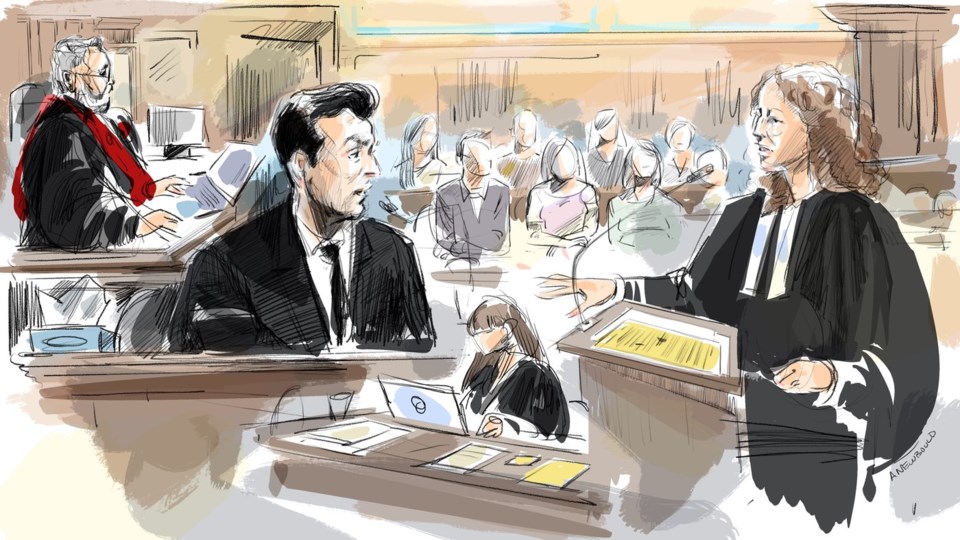WARNING: This article contains details about an alleged sexual assault.
Jacob Hoggard wrapped up his testimony in his sexual assault trial Wednesday after the Crown cross-examined the Canadian musician on apparent gaps in his memory.
Hoggard has pleaded not guilty and denied raping, choking and hitting his accuser after his band Hedley performed at a concert eight years ago.
The ex-lead singer of the band told a jury this week that he and the complainant had a consensual one-night stand after flirting and kissing during a bonfire after-party following the show in Kirkland Lake, Ont.
During cross-examination late Tuesday and early Wednesday, prosecutor Peter Keen tried to poke holes in Hoggard's description of the night.
He established that Hoggard doesn't have a clear memory of the beginning of the sexual activity in his hotel room, whether there could have been attempted anal sex, as the complainant alleged, and whether Hoggard may have asked to urinate on the woman.
In the woman's earlier testimony, she described feeling disgusted when, she said, Hoggard joined her in the shower following the alleged rape and asked if he could urinate on her. She said she told him no, but he did it anyway.
Hoggard has said the opposite happened. He said Tuesday that after the two engaged in oral sex in the bathtub, he asked her to urinate on him and she did so.
Keen tried to suggest to Hoggard that the urination would have been "much more in keeping with a coercive sexual encounter," but defence lawyer Megan Savard objected.
"To suggest that certain types of sexual acts are inherently less consensual I think is highly problematic," she said.
The prosecutor tried to rephrase the question but Savard rose for a second time.
"I'm going to object again, perhaps on behalf of every person in society who has any kind of fringe sexual practice," she said. "I think this is an offensive line of questioning."
Keen concluded his questions not long after that.
In her re-examination, Savard got several answers from Hoggard about his usual practices during sex. She asked whether he had any memory of actually urinating on the complainant.
"I would remember her letting me do that," he said.
She also revisited the question of anal sex, and whether Hoggard would have attempted it prior to vaginal intercourse as the complainant said took place.
"I never do that first," he said.
After Hoggard's testimony, the lighting operator for the Hedley concert, Jeremy Van Delft, was called as a witness.
While Hoggard had told court he went straight from the concert to the hotel to build the bonfire, Van Delft said the band and crew, including Hoggard, went to a bar after the show before returning to the hotel.
At the bonfire, he said he saw Hoggard and a woman speaking, and at the end of the night he saw the two of them walking back toward the hotel together.
Van Delft said he saw them enter Hoggard's hotel room via an interior hallway, and at least two other members of the crew or band were in the hallway at the same time.
The complainant had given a similar description of their entry into the room, while Hoggard had said he remembered entering through the room's patio doors.
Savard's co-counsel Kally Ho also asked Van Delft about common practice when it came to transporting the band back and forth, a job someone known as the "runner" would do.
The complainant had described entering a van outside the venue, along with members of the band and some teenage girls, in order to get to the bonfire after-party. She said she remembered a minivan with a sliding door.
Van Delft said it would have been "unlikely" and "unprofessional of the runner" to allow an unescorted fan inside the same vehicle as the band.
Eric Clarke, who said he lives in Kirkland Lake and worked as one of two runners that day, testified next. He agreed that when a band is being transported, the vehicle is their "personal space" and guests would not be invited in.
Hoggard, Van Delft and Clarke all described the vehicle being used for transportation that day as a white, 15-seat van that did not have a sliding door.
Clarke said some time after the concert, the other runner gave him and two teenage girls a ride to the hotel, where the bonfire was underway.
Once they got on the road, he said, "I may have been a little bit rude" in asking them which one would be having sex with Hoggard.
Clarke said that after reading a news article about Hoggard's trial, he assumed the complainant was one of the two girls he rode in the van with. But when shown a photo of the complainant taken that night, he said he couldn't confirm if she was one of them. He also agreed the runner would have made other trips between the venue and the hotel.
Last Friday, the complainant had been shown a photo of Clarke and the other runner during her cross-examination. She said she did not recognize them, but ultimately agreed it was possible they were in the van.
The defence is expected to conclude its case on Thursday, with closing arguments from both sides to follow.
This report by The Canadian Press was first published Oct. 2, 2024.
Marie-Danielle Smith, The Canadian Press
